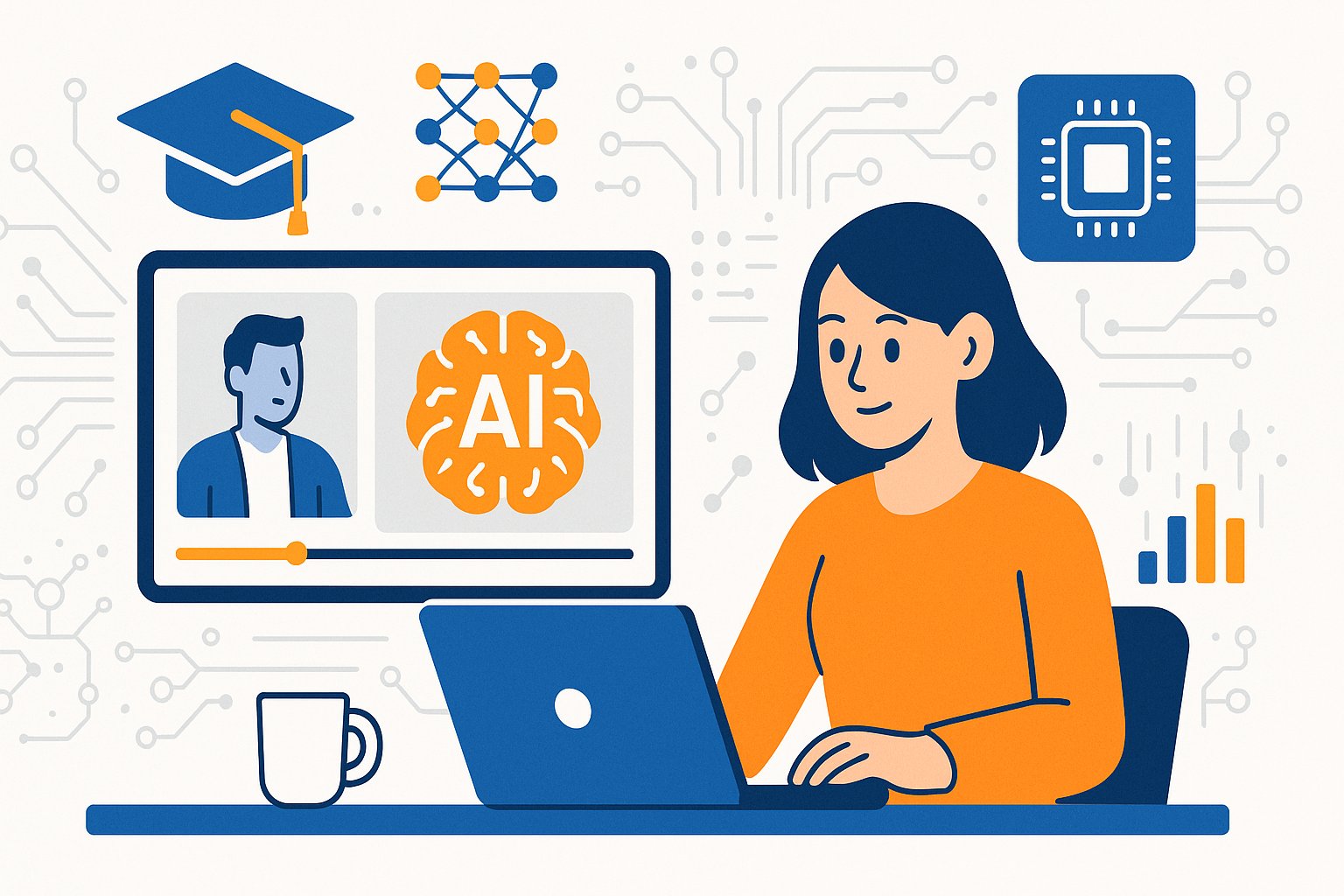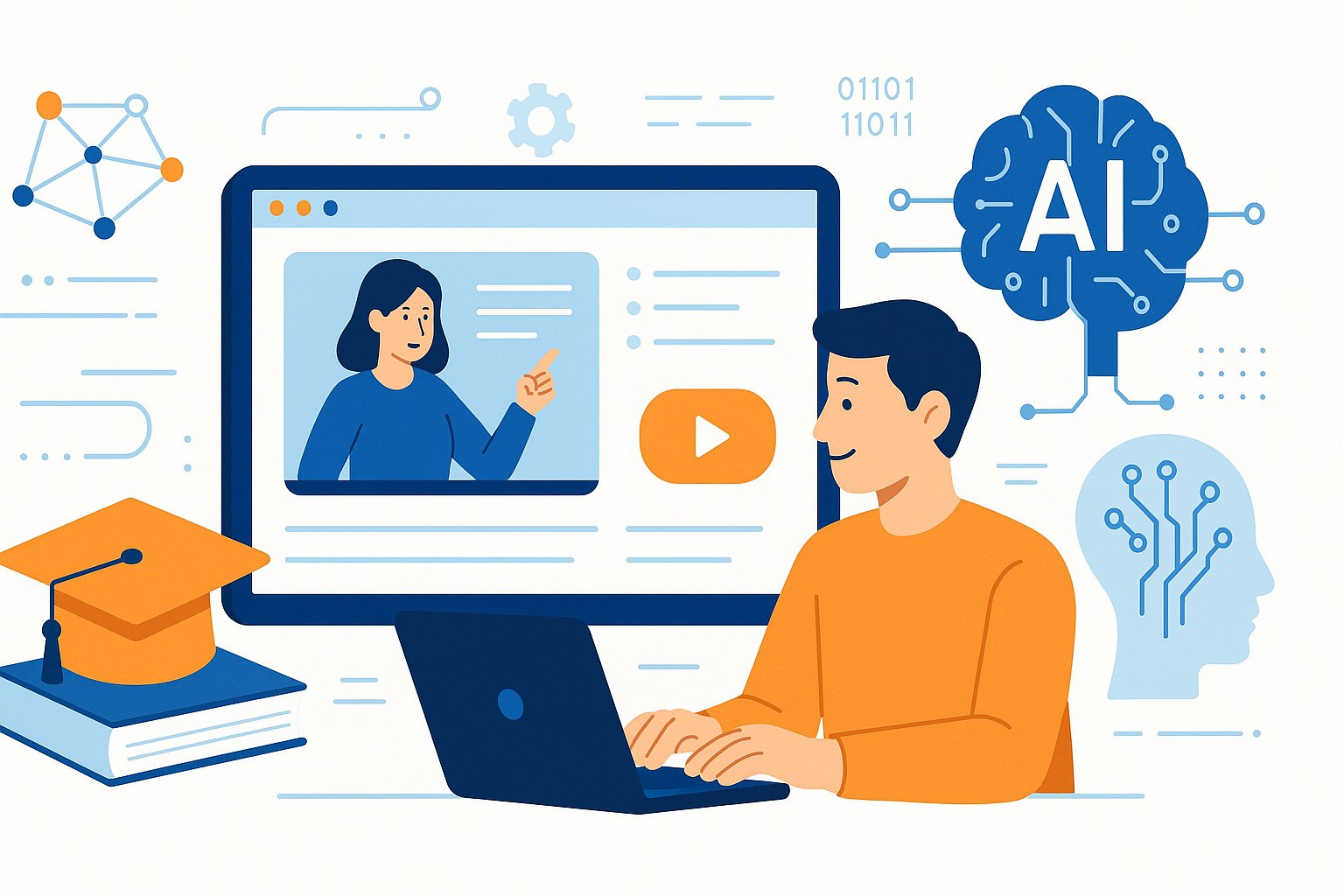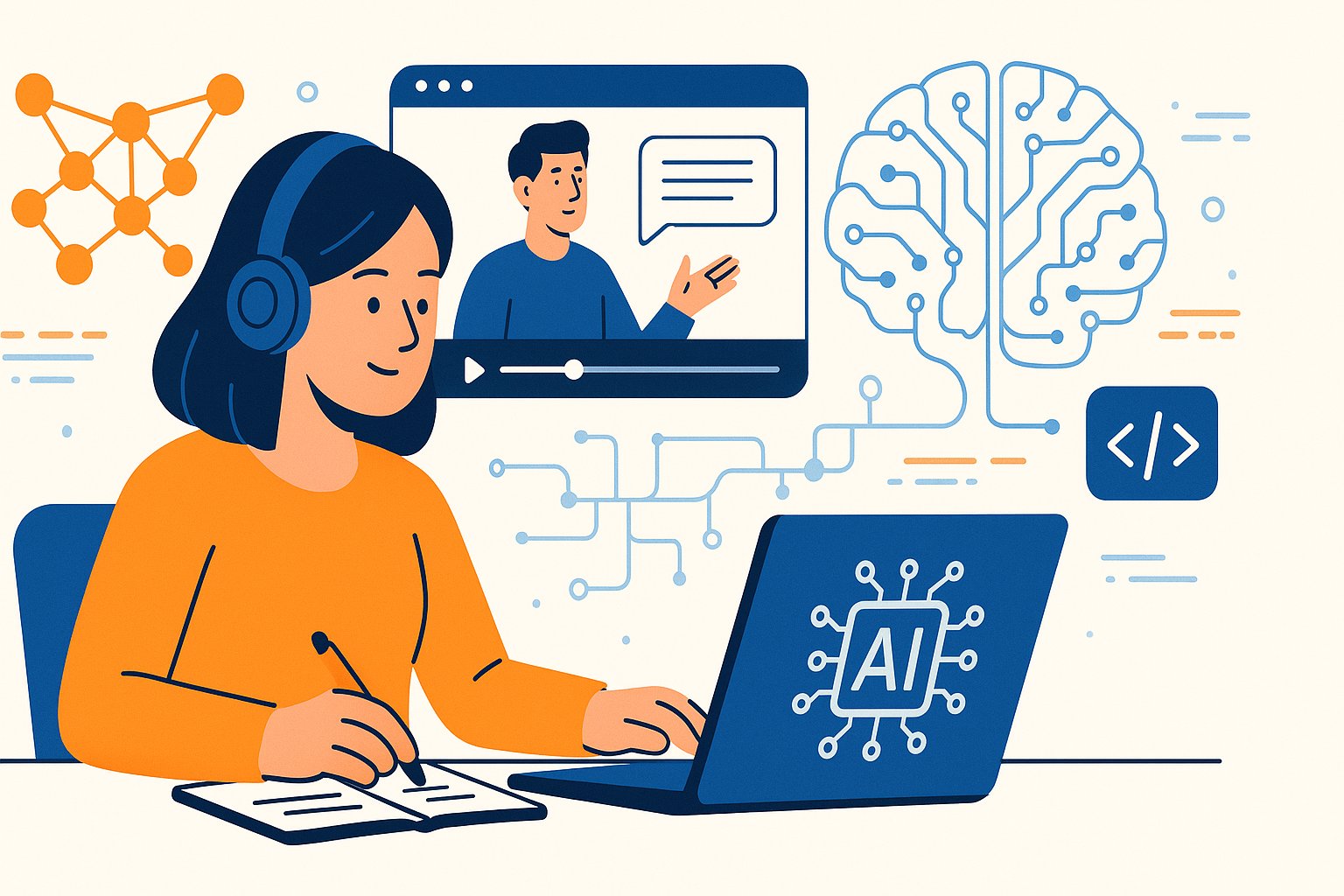30 Best AI Courses for Process Development Scientists to Future-Proof Your Career in 2025
Discover top AI courses tailored for process development scientists, designed to enhance skills and ensure career resilience by 2025. Explore cutting-edge programs that blend technology and science for innovative solutions and future-proof expertise.

As artificial intelligence (AI) continues to advance, its integration into various professional fields becomes more pronounced. For Process Development Scientists, who are at the forefront of innovation and optimization, the importance of understanding and leveraging AI cannot be overstated. The growing demand for AI skills reflects the urgent need for professionals to upskill and stay competitive in their careers. AI's potential to influence job functions and enhance productivity makes it a vital area of expertise for those in process development. This article aims to guide Process Development Scientists in identifying the most suitable AI courses that will equip them with the necessary skills to excel in their roles.
Why AI matters for Process Development Scientists today
AI's relevance for Process Development Scientists is underscored by the increasing adoption of AI technologies across various sectors. Recent statistics indicate that 69% of businesses are already utilizing AI in some capacity, highlighting its transformative impact. For Process Development Scientists, understanding AI is crucial to improving efficiency, driving innovation, and maintaining a competitive edge. This article seeks to assist professionals in this field by offering insights into ten AI courses that can significantly enhance their skill set and professional capabilities.
The Growing Role of AI in Process Development Scientists
AI applications in process development are diverse and impactful. Automation of routine tasks, enhanced decision-making capabilities, and personalized solutions are just a few of the ways AI is being applied. These innovations are reshaping workflows and allowing Process Development Scientists to focus on more strategic aspects of their work. AI tools can analyze vast datasets quickly, identify patterns, and predict outcomes, which are invaluable for process optimization and development.
Benefits of becoming an AI expert in Process Development Scientists
For Process Development Scientists, becoming proficient in AI offers numerous benefits. It empowers professionals to handle complex data analysis more efficiently, leading to improved process designs and innovations. AI expertise enhances problem-solving skills and decision-making processes, allowing scientists to identify opportunities for improvement and implement effective solutions. Moreover, AI knowledge increases job prospects, as industries increasingly seek professionals who can integrate AI technologies into their processes, ensuring they remain at the cutting edge of development.
This article compares ten AI courses tailored for Process Development Scientists, including the highly rated CompleteAI Training. These courses provide comprehensive education and practical insights into AI applications, equipping professionals with the skills needed to thrive in an AI-integrated environment.

Comparison: All AI Courses for Process Development Scientists (Updated Q2' 2025)
| Course Name | Provider | Price | Key Topics | Pros | Cons | Best For |
|---|---|---|---|---|---|---|
| AI for Process Development Scientists | CompleteAI Training | $29/month (monthly), $8.25/month billed annually | Video Courses, Certifications, AI tools, Industry news | Highest rating, Extensive range, Daily updates, Affordable pricing | Subscription based | Process Development Scientists professionals |
| Introduction to Artificial Intelligence (AI) | IBM via Coursera | Free to audit; $39-$79/month for certificate | Foundational AI concepts, Generative AI, Natural language processing | High rating, Beginner-friendly, Practical applications | May require upgrading for full access | General learners |
| Generative AI: Prompt Engineering Basics | IBM via Coursera | Free to audit; paid certificate option available | Prompt engineering, Generative AI models, IBM Cloud integration | Beginner-level, Practical skills, Highly rated | Limited to prompt engineering scope | General learners |
| AI For Everyone | DeepLearning.AI via Coursera | Free to audit; paid certificate option available | AI/ML basics, Data ethics, Strategic thinking | Highly rated, Broad overview, Accessible | Does not cover technical implementation | General learners |
| IBM AI Developer Professional Certificate | IBM via Coursera | $39-$79/month subscription (3-6 months) | Prompt engineering, Machine learning, Python programming | Extensive curriculum, Hands-on projects, High rating | Intermediate difficulty, Time commitment | General learners |
| Fundamentals of Machine Learning and Artificial Intelligence | Amazon Web Services via Coursera | Free | AI/ML fundamentals, AWS SageMaker, Applied ML | Free access, Practical AWS tools | AWS-specific content may require prior cloud knowledge | General learners |
| Machine Learning Specialization | DeepLearning.AI via Coursera | $39-$79/month subscription | Supervised/Unsupervised learning, Neural networks | High rating, Comprehensive, Hands-on coding | Requires programming background | General learners |
| Introduction to AI | Google via Coursera | Free to audit; paid certificate option available | Generative AI, Machine learning software, Innovation | High rating, Beginner-friendly | Short duration, Introductory level | General learners |
| IBM AI Product Manager Professional Certificate | IBM via Coursera | $39-$79/month subscription (3-6 months) | AI product lifecycle, Prompt engineering, Innovation | Business and management focus, Practical skills | Less technical, more strategic | General learners |
| IBM AI Engineering Professional Certificate | IBM via Coursera | $39-$79/month subscription (3-6 months) | Prompt engineering, PyTorch, NLP, Deep learning | Comprehensive, Hands-on, Intermediate level | Requires prior coding and AI knowledge | General learners |
| AI For Business Specialization | University of Pennsylvania via Coursera | $39-$79/month subscription (3-6 months) | AI personalization, Data ethics, Business strategy | Business-centric, Strategic insights | Less technical depth | General learners |
Understanding AI Training for Process Development Scientists Professionals
Artificial Intelligence (AI) is increasingly becoming a vital tool across various scientific disciplines, including process development. As professionals in this field seek to integrate AI into their workflows, a range of courses is available that cater specifically to their needs. This article provides a comparison of AI courses that are particularly beneficial for Process Development Scientists, evaluating each based on content, cost, and suitability for different professional levels.
Course 1: CompleteAI Training

CompleteAI Training offers an extensive library of over 100 specialized video courses and certifications designed specifically for Process Development Scientists. This subscription-based service delivers comprehensive AI education and daily updates on the latest AI tools and industry news. The courses are well-suited for professionals looking to stay current with AI advancements in process development.
Key Topics Covered: AI concepts, industry-relevant tools, certifications, and daily updates.
Target Audience and Skill Level Requirements: Ideal for Process Development Scientists at any career stage looking for a comprehensive AI learning path.
- Pros:
- Extensive range of AI courses and certifications specifically tailored for Process Development Scientists.
- Daily updates on relevant AI tools and news.
- Affordable pricing, especially with annual billing.
- Cons:
- Requires an ongoing subscription for continuous learning as AI evolves.
Who Would Benefit Most: Professionals deeply involved in process development who wish to maintain current AI knowledge and skills through continuous learning.
Course 2: Introduction to Artificial Intelligence (AI) by IBM via Coursera

Introduction to Artificial Intelligence (AI) by IBM is a beginner-level course that covers foundational AI concepts such as generative AI and natural language processing. This course is suitable for scientists interested in understanding the basics of AI and its applications across various fields, including process development.
Key Topics Covered: Generative AI, ChatGPT, NLP, and market opportunities.
Target Audience and Skill Level Requirements: Ideal for scientists new to AI, with no prior experience required.
- Pros:
- High rating (4.7/5), beginner-friendly, and short duration (1-4 weeks).
- Focuses on practical AI applications.
- Cons:
- May require upgrading for full access and certification.
Who Would Benefit Most: Beginners looking to grasp AI fundamentals applicable to process development and beyond.
Course 3: Generative AI: Prompt Engineering Basics by IBM via Coursera

Generative AI: Prompt Engineering Basics is a course that focuses on the intricacies of prompt engineering with generative AI models like ChatGPT. It includes hands-on experience with large language modeling and IBM Cloud integration, making it particularly useful for process development scientists looking to optimize workflows and data interpretation.
Key Topics Covered: Prompt engineering, large language models, IBM Cloud integration.
Target Audience and Skill Level Requirements: Designed for beginners interested in practical AI applications.
- Pros:
- Highly rated (4.8/5), beginner-level, and focused on practical skills.
- Cons:
- Limited to prompt engineering scope.
Who Would Benefit Most: Process development scientists interested in leveraging generative AI for workflow optimization.
Course 4: AI For Everyone by DeepLearning.AI via Coursera

AI For Everyone by DeepLearning.AI offers a non-technical introduction to AI. The course covers key concepts such as data ethics, AI/ML basics, strategic thinking, and business implications, making it ideal for scientists who want to understand AI’s role in organizational and process innovation without delving into technical details.
Key Topics Covered: Data ethics, AI/ML basics, strategic thinking, business implications.
Target Audience and Skill Level Requirements: Suitable for professionals from all backgrounds seeking a broad overview of AI.
- Pros:
- Highly rated (4.8/5), accessible for all backgrounds, broad overview.
- Cons:
- Does not cover technical implementation details.
Who Would Benefit Most: Scientists aiming to gain a strategic understanding of AI’s impact on process development.
Course 5: IBM AI Developer Professional Certificate by IBM via Coursera

IBM AI Developer Professional Certificate offers a comprehensive curriculum that includes prompt engineering, software development lifecycle, machine learning, Python programming, and AI tools like Flask and ChatGPT. This course is suitable for process development scientists aiming to build AI-driven applications and automate processes.
Key Topics Covered: Prompt engineering, software lifecycle, machine learning, Python, AI tools.
Target Audience and Skill Level Requirements: Intermediate level; suitable for those with some programming experience.
- Pros:
- Extensive curriculum, hands-on projects, high user rating (4.6/5).
- Cons:
- Requires time commitment and intermediate difficulty level.
Who Would Benefit Most: Process development scientists eager to develop AI-driven applications and enhance automation capabilities.
Course 6: Fundamentals of Machine Learning and Artificial Intelligence by Amazon Web Services via Coursera

Fundamentals of Machine Learning and Artificial Intelligence provides insights into AI/ML fundamentals, deep learning, AWS SageMaker, and applied machine learning techniques. This course is beneficial for scientists interested in applying machine learning models to process data and optimize development workflows.
Key Topics Covered: AI/ML fundamentals, AWS SageMaker, deep learning, applied techniques.
Target Audience and Skill Level Requirements: Suitable for mixed skill levels; prior cloud knowledge may be helpful.
- Pros:
- Free access, practical AWS tools, good for mixed skill levels.
- Cons:
- Some AWS-specific content may require prior cloud knowledge.
Who Would Benefit Most: Scientists interested in leveraging AWS tools for machine learning applications within process development.
Course 7: Machine Learning Specialization by DeepLearning.AI via Coursera

Machine Learning Specialization covers supervised and unsupervised learning, decision trees, neural networks, and reinforcement learning. This specialization is valuable for process development scientists to understand predictive modeling and automation.
Key Topics Covered: Supervised/unsupervised learning, decision trees, neural networks, reinforcement learning.
Target Audience and Skill Level Requirements: Requires a programming background; suitable for those seeking in-depth knowledge.
- Pros:
- High rating (4.9/5), comprehensive, hands-on coding with Python.
- Cons:
- Requires programming background.
Who Would Benefit Most: Scientists with programming skills looking to deepen their understanding of machine learning for predictive modeling.
Course 8: Introduction to AI by Google via Coursera

Introduction to AI by Google offers insights into generative AI, machine learning software, innovation, and data quality. This course is tailored for scientists seeking a Google-backed introduction to AI concepts relevant to process innovation.
Key Topics Covered: Generative AI, machine learning software, data quality, innovation.
Target Audience and Skill Level Requirements: Beginner-friendly; no prior experience required.
- Pros:
- High rating (4.9/5), beginner-friendly, short duration.
- Cons:
- Introductory level; may not offer in-depth content.
Who Would Benefit Most: Beginners looking for a foundational understanding of AI with potential applications in process development.
Course 9: IBM AI Product Manager Professional Certificate by IBM via Coursera

IBM AI Product Manager Professional Certificate focuses on the AI product lifecycle, prompt engineering, innovation, and stakeholder management. This course is useful for scientists involved in managing AI projects or integrating AI into process development pipelines.
Key Topics Covered: AI product lifecycle, prompt engineering, innovation, stakeholder management.
Target Audience and Skill Level Requirements: Suitable for business and management roles; less technical focus.
- Pros:
- Business and management focus, practical skills, good ratings (4.7/5).
- Cons:
- Less technical, more strategic.
Who Would Benefit Most: Scientists transitioning into management roles overseeing AI projects.
Course 10: IBM AI Engineering Professional Certificate by IBM via Coursera

IBM AI Engineering Professional Certificate is an advanced course that covers prompt engineering, PyTorch, Keras, reinforcement learning, natural language processing, and deep learning. It is suitable for process development scientists with programming skills aiming to engineer AI solutions.
Key Topics Covered: Prompt engineering, PyTorch, Keras, reinforcement learning, NLP, deep learning.
Target Audience and Skill Level Requirements: Intermediate level; requires prior coding and AI knowledge.
- Pros:
- Comprehensive, hands-on, highly rated (4.6/5).
- Cons:
- Requires prior coding and AI knowledge.
Who Would Benefit Most: Scientists with programming expertise aiming to create AI solutions for process development.
In conclusion, selecting the right AI course depends on your current skill level, career goals, and the specific areas of AI that align with your professional needs. For those seeking a comprehensive and continuous learning experience tailored specifically for Process Development Scientists, CompleteAI Training stands out as a top choice. However, for beginners or those looking to focus on specific AI applications, courses like Introduction to AI by IBM or Google’s Introduction to AI are excellent starting points. Advanced learners may benefit from the IBM AI Engineering Professional Certificate to deepen their technical expertise and apply AI solutions in their work.




